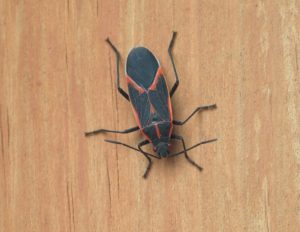 Winters in Indiana and Illinois aren’t exactly balmy. Stepping from the bitterly cold outdoors into your warm and comfortable home is always a blessed relief at this time of year. Unfortunately, humans aren’t the only creatures that share this sentiment, and homeowners sheltering from the cold this winter may be unknowingly sharing their homes with a variety of unwanted pests.
Winters in Indiana and Illinois aren’t exactly balmy. Stepping from the bitterly cold outdoors into your warm and comfortable home is always a blessed relief at this time of year. Unfortunately, humans aren’t the only creatures that share this sentiment, and homeowners sheltering from the cold this winter may be unknowingly sharing their homes with a variety of unwanted pests.
Box elder bugs are frequently found in northern homes at this time of year and can become a serious nuisance if they make their way into your home in large numbers. If you are having trouble with box elder bug infestations during the winter months, you can take a number of steps to remove these unwanted squatters and prevent future invasions.
Why Are Box Elder Bugs Infesting Your Home?
Box elder bugs are hardy insects, but they cannot survive exposure to freezing temperatures. Adult bugs will therefore seek shelter in warm, secluded areas during the worst of the winter weather.
Unfortunately, your heated home makes an attractive overwintering spot for box elder bugs, and they frequently hide beneath wall siding and inside wall cavities when the temperature drops. Clusters of box elder bugs may also be found sunning themselves near attic windows or hiding in cracks in your home’s foundations and basement.
However, once they find a suitable hiding spot, box elder bugs do not hibernate like warm-blooded animals. Instead, they enter a semi-dormant state and will quickly become active when they sense warmth. As the mercury drops and you crank up the heat, box elder bugs may mistake the increasing warmth for the coming of spring and start to emerge from their hiding spots to search your home for food and water.
Box elder bugs do not bite or spread diseases, and an undisturbed group of dormant bugs will usually go unnoticed. However, active bugs produce foul-smelling chemicals when threatened, and smashed bugs can permanently stain carpets and furniture, so any box elder bugs present in your home should be removed before they can cause any damage.
What Should You Do About Box Elder Bug Infestations?
If you are only finding a few box elder bugs inside your home, you may be able to tackle the problem yourself with items you already possess. A vacuum with a hose attachment is an excellent way to collect and destroy bugs without accidentally smashing them. You can also kill them reasonably quickly with a solution of dish soap and water, which suffocates the pests.
However, you may be unfortunate enough to disturb a large cluster of box elder bugs while moving furniture or reorganizing your attic or basement. In these circumstances, you should call in a professional pest control service to spray badly affected areas with insecticides.
Bear in mind that adult box elder bugs are surprisingly tough, and numerous insecticidal treatments may be necessary to completely eradicate a large colony. However, insecticides will reliably kill juvenile bugs, which will help control future numbers. Make sure your pest control uses a residual insecticide that remains active for some time for the best results.
How Can You Prevent Future Box Elder Bug Infestations?
Preventing box elder bug infestations is always easier (and cheaper) than eradicating them. However, the only surefire way to prevent box elder bug problems in your home is to remove all box elder and silver maple trees near your home, as these trees provide food and breeding grounds for bugs during the warmer months. This can be expensive and is usually impractical.
Instead, you should seal any and all gaps in your home’s walls, windows, and foundations to deny bugs access to your home in the first place. Caulk cracked walls and window frames, replace damaged window screens and wall siding, and make sure your doors have robust weather seals. Your pest control company can help you determine the most likely entry points.
If you have any more questions on how to deal with box elder bug problems, or want to know about other common pests that hide in homes during winter, contact the pest control experts at Guardian Pest Control today.
